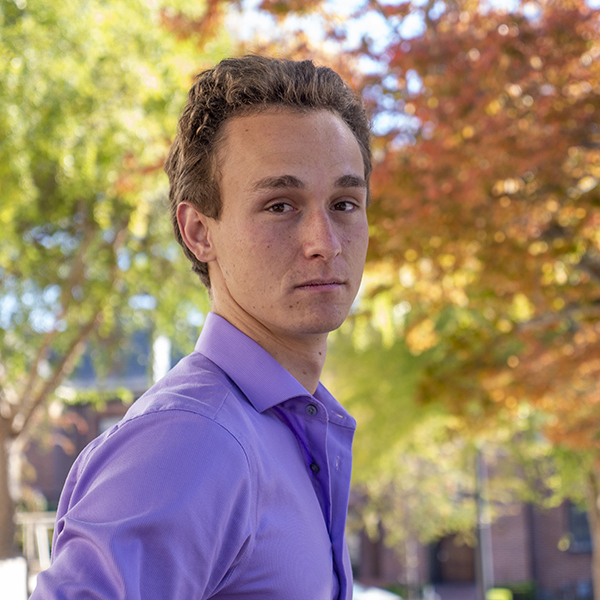 Hometown: San Carlos, CA
Hometown: San Carlos, CA
Education: UC Davis
Affiliations: International Human Rights Law Clinic
During my 1L year I went to a lunch a presentation at the law school for the Keta Taylor Colby Death Penalty Project. It’s a program that places law students at under-resourced death penalty offices in the south. I came out of it thinking, ‘wow’—I get chills thinking about it now.
My father was a prosecutor. He spent the majority of his career, and my entire life growing up, with the San Mateo County District Attorney’s Office. That was always an influence in my life. I totally acknowledge prosecutors have a very important role to play in society. The crimes that people who are accused of for death penalty-eligible crimes, which are always murder plus an aggravating factor, are heinous. But I still believe you’re more than the worst thing you’ve ever done. I believe in mercy. The possibility that I could do something so impactful, so important, so literally life or death, after my first year of law school really blew me away. It was the only thing I applied to.
I was placed at the Mississippi Office of the State Public Defenders Capital Defense Division. As I was organizing my trip out there, the coronavirus pandemic was just starting and they notified us that the program would be remote. But I went out there anyway.
I had no idea what I would be working on, but it turned out that my supervisor was one of the attorneys who had represented Curtis Flowers at the Supreme Court (see In the Dark, Season 2 podcast for in-depth look at the decades-long wrongful conviction legal saga). Following Flowers’ sixth trial (previous trials had either resulted in hung juries or were struck down by higher courts for prosecutorial misconduct) in which the Mississippi Supreme Court had not found a Batson violation (a claim of racial discrimination in peremptory strikes in jury selection), it was appealed to the U.S. Supreme Court. To paraphrase Justice Brett Kavanaugh, who wrote for the majority, he basically says: “Excuse me. Looking at the totality of the circumstances, there actually is a Batson violation.” Justice Kavanuagh looked at the Mississippi Supreme Court’s majority decision and told them they were doing the Batson analysis wrong, but that Justice King’s dissenting opinion was doing the analysis correctly. So the Supreme Court remands the case for a new trial again. Then, Doug Evans, the prosecutor who had seen this case through six trials, recused himself. The case was transferred to the State Attorney General who finally dismissed the charges (in September 2020). Curtis Flowers is now a free man, thank God.
After the Flowers opinion, there was another Batson case in the Mississippi Supreme Court, Eubanks v. State, where the majority found no Batson violation. Outrageously, the Mississippi Supreme Court basically ignores the US Supreme Court previous decision in Flowers, so unsurprisingly Justice King dissents again. To paraphrase the dissent: “Hey majority of the Mississippi Supreme Court, we just got overturned in the Flowers case and here we are again analyzing these Batson claims wrong.” So a lot of my work was looking at Justice Kavanaugh’s Flowers opinion and the lines of evidence he focused on and drafting a memo for my boss who was writing a brief for an appeal to the Mississippi Supreme Court.
I hadn’t even taken Criminal Procedure yet, so I was only vaguely familiar with capital punishment law and Batson claims, mainly from listening to the In the Dark podcast and reading some of a capital punishment textbook. I reached out to Professor Elisabeth Semel, director of Berkeley Law’s Death Penalty Clinic, to try to get resources. She shared with me their recent report on “Whitewashing the Jury Box” in California. That was very, very helpful in understanding the potential for implicit bias in jury selection and how a prosecutor could make racial appeals without necessarily explicitly referencing race. It was really cool to get to see some of my research in the brief to the Mississippi Supreme Court.
I consider my first summer a huge learning experience. A big part of that experience was, despite a virtual internship, I got to live and work in Jackson, MS. Given the history of the death penalty and the South, it was very important for me to go to Mississippi and experience what that part of the country is like.
So I arrived in Mississippi right after George Floyd’s death. I was working on these issues of racial oppression and racial discrimination during the height of this swelling racial justice movement. The State’s legislature even voted to hold a referendum and replace their current state flag, which incorporated the confederate battle flag in its design, with a new flag which did not bear that vestige of institutional racism. That is truly historic.
Ultimately, the experience made me far more committed in my beliefs that the death penalty’s wrong in all circumstances. It was also personally very gratifying to feel like I can have a small part to play in correcting some of the injustices of racial oppression in our society.